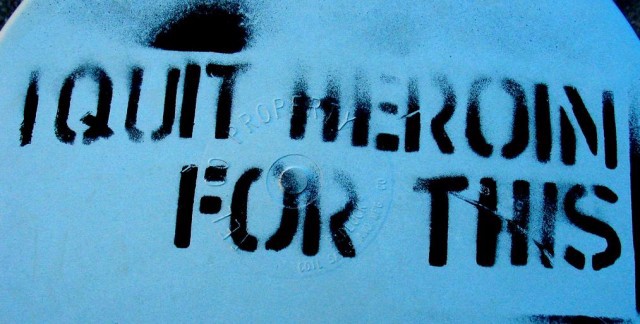What's Wrong With Addiction Literature?
by Brendan O’Connor

Elizabeth Wurtzel is writing a new book. You may have accidentally read some of it already. Her piece published on Thought Catalog earlier this month is an excerpt from it. The book is titled Yes because that is Elizabeth Wurtzel’s favorite one-word sentence. She told us so last night, during her reading at “Addiction Literature,” hosted by the No. 8 Literary Society at the bar No. 8, which is the descendant of Bungalow 8. The working subtitle of Wurtzel’s book is “A History Of Love At First Sight In New York.”
The excerpt — as it first appeared on Thought Catalog — is titled “Just That Way.” It is about how she has an affair with a married man who had otherwise been faithful for the first decade of his marriage. This story, she told us, is adapted from an email she wrote to another man, explaining the nature of the relationship. “Men are evil,” she said. “I’m diabolical.”
She clutched the stem of an over-full glass of red wine like it was a subway pole. But then again, she’s old. (But not too old.) She wrote about being old (but not too old) for New York magazine dot com. “I am lucky: I run, and Gyrotonic sessions three times a week have kept me in the same shape I have always been in,” she wrote.
“Everyone who said they were going to die before they got old did so at age 27 and the rest have doggedly and pathetically and triumphantly persevered,” Wurtzel recently wrote at the Daily Beast. Well. The first person in the band who played this song to die did so while detoxing from alcohol at age 32; the next one died of a cocaine-induced heart attack at 57. The other two are still alive: the person who actually wrote the lyric is 68, and the person who sang it is 69. But Wurtzel probably knows that.
Wurtzel is worried about young people, because they don’t listen to enough rock and roll as much as she — an old-but-not-too-old person who has done a lot of drugs — would like. Specifically, they don’t listen to enough Led Zeppelin. The members of Led Zeppelin also did a lot of drugs. One of them even died when he was 32! (He choked on his own vomit.) It doesn’t matter that young people today have their own version of co-opted black music to listen to, though; Led Zeppelin is way better.
Wurtzel was joined by someone who once played the keyboard for the Brian Jonestown Massacre. (The Brian Jonestown Massacre was a rock and roll band who did a lot of drugs in the ‘90s.) He was also once in Kenickie, which is far more notable. The keyboardist looked very rock and roll in a t-shirt and blazer with several pins on the lapel. He wore a fedora and announced that he is writing a new book, as well! (He’s written two already. They were published by major publishing houses and he will be publishing his new book himself.) “As much fun as it is getting fucked in the ass with no lube,” he said, “I decided to do something for myself.”
The keyboardist for the Brian Jonestown Massacre read about how methadone is not as satisfying as heroin. He did not read about any experience he might have with ass-fucking, but he did talk about prison rape. There was a lot of blood and swearing and some soaring prose lamenting the fact that there are no statues commemorating dead junkies. He took a dramatic swig of Stella Artois. One worried that his fedora might fall off.
Another reader was James Freed. James Freed read an excerpt from his book about a struggling writer in his 30s who turns to drugs. This writer takes drugs and wanders around New York City — that’s where we are! — looking for inspiration. He comes across a man who tells him a story about buying Henry Miller a drink. (This is what’s called a ‘frame narrative’ and it is a terribly sophisticated way of telling a story. Chaucer’s Canterbury Tales is a frame narrative, and so is Joseph Conrad’s Heart Of Darkness. Neither of those books are addiction literature, however — unless you are addicted to COLONIALISM.) Anyway, he tells the struggling writer a story about meeting Henry Miller in a bar, and buying Henry Miller a drink, and walking across the Brooklyn Bridge with Henry Miller, and ending up in Walt Whitman’s house, and the writer wants to go into the attic because that’s where Whitman wrote his poetry, except first they have to go into the basement and it turns out that it’s an insane asylum for people who don’t know what is real, and then the writer goes back to his house and kills his girlfriend. Freed read all of this quite breathlessly.
Susan Kirschbaum, who organized the event, read an excerpt from her book Who Town about how a needle full of drugs is like a penis but better. Her microphone kept cutting in and out.
The difficulty presented by writing about addiction is that the writer has chosen a subject which is, by definition, utterly tedious. The boredom of looking for your next fix isn’t worth writing about — Wurtzel knows this. All that exists or matters for the addict is the addiction. All of life’s meaning is reduced to the satisfaction of this one immense urge: satisfaction that takes the form of oblivion. This is a real, tragic thing that happens to real people. It ruins lives, although, apparently, sometimes it doesn’t ruin some of them enough. The story of that ruination isn’t in and of itself an interesting one. Before she read from Thought Catalog, Wurtzel read from her memoir More, Now, Again. “Every addict tells the same story,” she said. Right?
Brendan O’Connor is a writer in New York. Image by Christopher Sessums.
